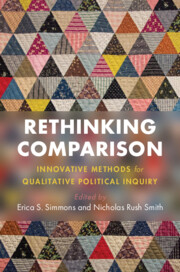Book contents
- Frontmatter
- Dedication
- Contents
- List of Figures
- List of Tables
- List of Contributors
- Acknowledgments
- 1 Rethinking Comparison: An Introduction
- Part I Rethinking the Building Blocks of Comparison
- 2 Beyond Mill: Why Cross-Case Qualitative Causal Inference Is Weak, and Why We Should Still Compare
- 3 Two Ways to Compare
- 4 Unbound Comparison
- 5 On Casing a Study versus Studying a Case
- 6 From Cases to Sites: Studying Global Processes in Comparative Politics
- Part II Developing New Approaches to Comparison through Research
- Theory and Imagination in Comparative Politics: An Interview with Lisa Wedeen
- Index
4 - Unbound Comparison
from Part I - Rethinking the Building Blocks of Comparison
Published online by Cambridge University Press: 24 September 2021
- Frontmatter
- Dedication
- Contents
- List of Figures
- List of Tables
- List of Contributors
- Acknowledgments
- 1 Rethinking Comparison: An Introduction
- Part I Rethinking the Building Blocks of Comparison
- 2 Beyond Mill: Why Cross-Case Qualitative Causal Inference Is Weak, and Why We Should Still Compare
- 3 Two Ways to Compare
- 4 Unbound Comparison
- 5 On Casing a Study versus Studying a Case
- 6 From Cases to Sites: Studying Global Processes in Comparative Politics
- Part II Developing New Approaches to Comparison through Research
- Theory and Imagination in Comparative Politics: An Interview with Lisa Wedeen
- Index
Summary
The education of political and social scientific desire for area studies to be more like the disciplines or call it a day gives rise to doubts that in either event area studies have anything left to offer genuinely comparative inquiry. Their exotic charms, broadened horizons, and humorous vignettes notwithstanding, what can area studies really do for today’s determined comparativist? Are they irredeemably undisciplined or might they have discernible logics of comparison after all? What could justify the rubric of area studies as comparative method – and with what implications for rethinking how and why we compare? This chapter tackles these questions in three parts. In the first, it takes Asian studies as a sufficiently representative and capacious subcategory of area studies and critically reviews debates about the comparative qualities of political and social studies there. The second draws on the first to identify and challenge ontological and epistemological presuppositions of arguments discounting the inherently comparative qualities of area studies. The third makes a case for area studies not just as inherently comparative but also as a comparative method, one whose logics are unbound, deterritorializing, and found in translation. The chapter concludes not by calling for area studies to be reconciled with the disciplines but by comparing and celebrating their points of difference.
Keywords
- Type
- Chapter
- Information
- Rethinking ComparisonInnovative Methods for Qualitative Political Inquiry, pp. 64 - 83Publisher: Cambridge University PressPrint publication year: 2021
- 4
- Cited by

